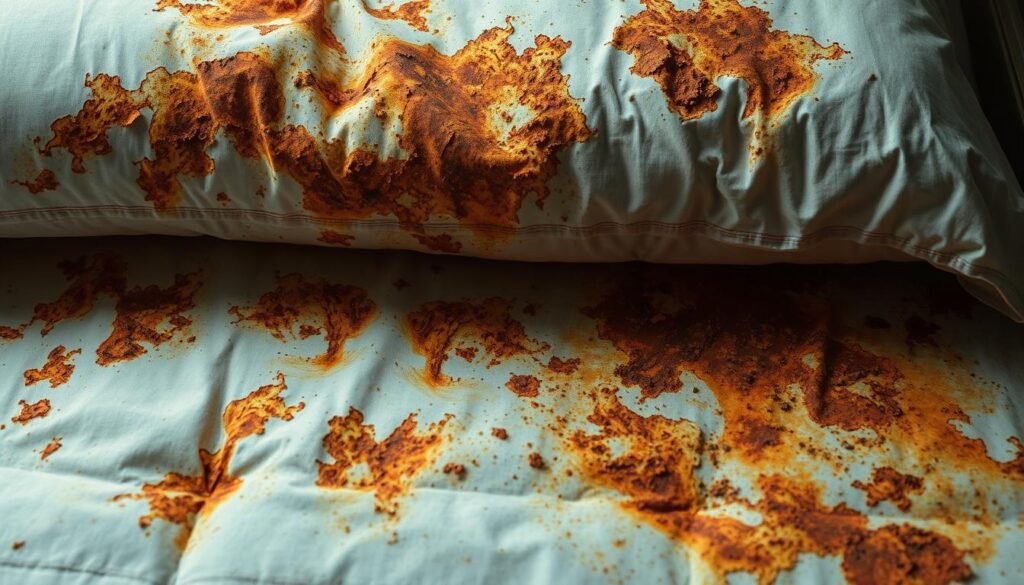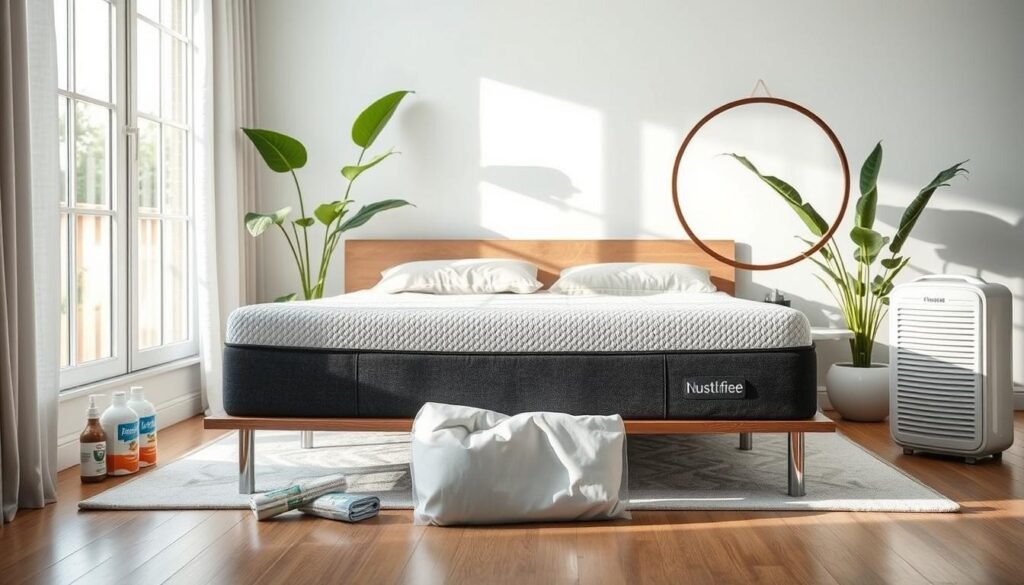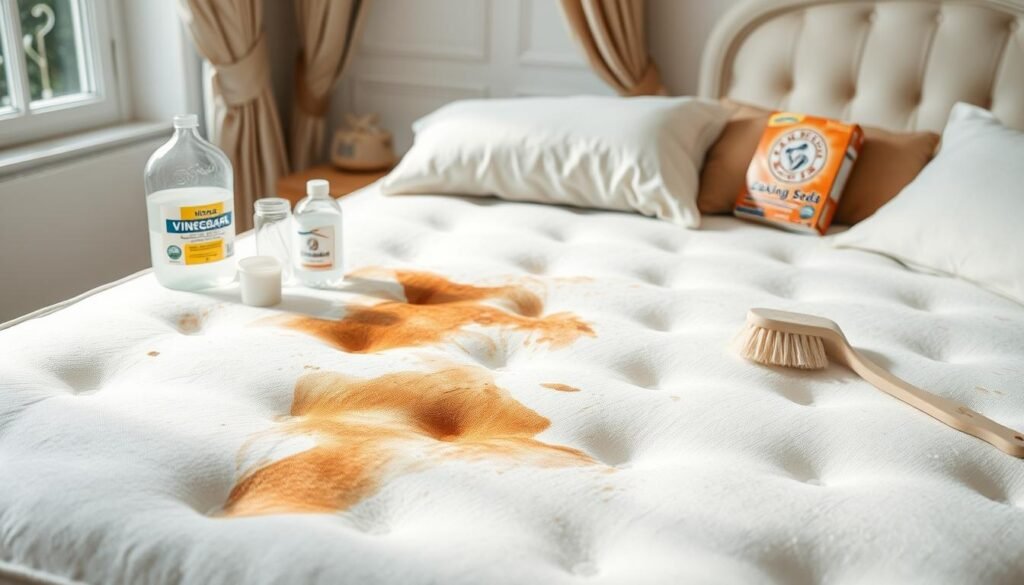Did you know that 70% of mattresses in the U.S. show rust stains or discoloration1? Rust can harm your mattress, causing ugly spots and health risks. We’ll explore rust’s impact on mattresses, how to prevent it, and how to remove it.
What is Rust?
Definition and Formation of Rust
Rust is a reddish-brown corrosion that forms on iron or steel when exposed to oxygen and moisture2. It happens when iron reacts with water and oxygen, creating iron oxide, or rust2. Rust forms when metal is exposed to too much air moisture for too long2.
Rust and Mattresses
Mattresses, like those with metal coils, can get rust stains and damage1. Spills or a humid room can make rust form on metal parts1. Cheap materials in mattresses make them more likely to get rust stains1.
Will Rust Spread on a Mattress?
Rust can spread on a mattress if the right conditions keep happening1. Things like sweat, bad air in the room, and mattresses on the floor can make rust worse1. Without stopping it, rust can keep getting worse and damage your mattress more.
Preventing Rust on Mattresses
Humidity Control and Proper Ventilation
Keeping your bedroom well-ventilated and dry is key to stopping rust on mattresses1. Good air flow reduces moisture, which lowers rust chances1. A waterproof mattress protector also keeps moisture out, stopping rust stains1.
Removing Rust from Mattresses
If rust appears on your mattress, act fast to avoid more damage1. Clean and dry spills quickly, and use rust stain removers1. Also, rotate and flip your mattress as the maker suggests to avoid rust spots1.
Conclusion
Rust is a big problem for mattresses, affecting their quality and life. Knowing how to prevent and remove rust can protect your mattress. Quick action and proper care can keep your mattress in good shape.
Key Takeaways
- Rust is a common issue, affecting up to 70% of mattresses in the United States.
- Moisture exposure, low-quality materials, and poor ventilation can contribute to rust formation on mattresses.
- Rust can spread on a mattress if the underlying conditions that lead to its formation persist.
- Maintaining a well-ventilated and low-humidity bedroom, using a waterproof mattress protector, and promptly cleaning spills can help prevent rust.
- Specialized rust stain removers, rotating the mattress, and following manufacturer recommendations can effectively remove and mitigate rust issues.
What is Rust?
Definition and Formation of Rust
Rust is a reddish-brown corrosion that forms on iron or steel surfaces. It happens when these metals are exposed to air and moisture. The rusting process creates iron oxide, which is weaker than the original metal3.
This chemical reaction occurs when iron is exposed to elements like high humidity or water. Factors like nature’s minerals, chemicals, and temperature changes can speed up rust formation3.
To stop rust, it’s important to keep iron, water, and oxygen apart. This prevents the unwanted reaction3. Ways to prevent rust include storing metal items inside, drying them before storage, and using protective coatings3.
Some substances like lemon juice, vinegar, and potatoes can reverse rust on metal3. There are also tips for removing rust from concrete, treating garage door rust, and fixing car rust3.
Iron-containing metals can rust, but some alloys, like stainless steel, resist it4. Stainless steel has a lot of reactive chromium, which helps it not rust4. Galvanization also protects steel by using zinc as a barrier4.
In summary, rust is a common issue with iron-containing metals. But, there are many ways to prevent and reverse it. Knowing how rust forms is the first step to dealing with it34.
Rust and Mattresses
Rust can be a big problem with mattresses. They often have metal parts like coil springs and frames5. Even though rust isn’t as common on mattresses as on other metal, it can happen, mainly in damp places5. Rust can make the mattress less sturdy, less pretty, and less comfy.
Rust forms when iron, oxygen, and moisture mix together6. Weather like rain or sunlight can speed up this process. Scratches or paint damage can also expose metal to rust7.
To stop rust, keep the air around your mattress dry and well-ventilated5. Cleaning metal parts with a dry cloth regularly can also help6. You can also use a water-repellent layer like paste wax or paint to protect the metal6.
If rust does show up, deal with it fast. Using white vinegar with salt can help remove rust from metal6. But if the rust is bad, it might be best to get a new mattress to avoid health issues5.
Knowing how rust happens on mattresses and taking steps to stop it can keep your mattress comfy and long-lasting.
will rust spread on a mattress
Rust can spread on a mattress if it’s not fixed quickly. If rust starts, it can move to other parts of the mattress. This happens if the mattress isn’t well-protected or cared for8.
The speed of rust spreading depends on several things. These include how bad the rust is, what the mattress is made of, and the environment around it.
Rust stains on mattresses often come from moisture. This can be from metal bed frames, box springs, or coils8. Bed bugs can also leave brown marks from their waste or when they’re squished8. Spills like coffee or tea can make hard brown stains. Sweat can cause brown and yellow spots and stains8.
Urine stains are common on kids’ mattresses, mainly during toilet training. Blood stains from injuries or periods can also leave rust-colored marks if not treated fast8. Moisture and humidity can make mold and mildew grow, causing brown or discolored spots8.

To stop rust from spreading, fix any rust right away. Use a mattress protector to keep spills and stains away. This can make your mattress last longer8.
Regularly vacuum and rotate your mattress to keep it in good shape8. Clean spills right away to stop stains from getting worse8.
By keeping your mattress clean and dry, you can lower the chance of rust spreading. This will help your mattress last longer8.
Preventing Rust on Mattresses
Humidity Control and Proper Ventilation
To keep a mattress rust-free, we need to control humidity and ensure good airflow. Keeping the bedroom’s humidity below 50% can stop rust from forming on mattress parts9. Also, having enough air moving around the mattress helps prevent moisture and rust1.
Using dehumidifiers, air conditioning, or placing the mattress in a well-ventilated area can help9. Regularly rotating the mattress monthly also helps with airflow and prevents rust9. It’s best to dry clothes and towels elsewhere to avoid extra moisture in the bedroom9.
By controlling humidity and ensuring good ventilation, we can stop rust from forming on our mattresses1. Taking these steps can make our mattresses last longer and keep our sleep area clean and healthy8.
| Humidity Control Strategies | Ventilation Techniques |
|---|---|
|
|

“Reducing humidity, such as drying clothes outside the bedroom and opening windows each morning, can greatly reduce mould and rust.”
Removing Rust from Mattresses
If rust has already formed on your mattress, there are ways to get rid of it. Mechanical cleaning techniques, such as brushing or scrubbing the affected areas, can help remove rust stains1. You can also try chemical treatments using rust removal solutions or vinegar-based cleaners to dissolve the rust1.
For tough rust, professional cleaning services might be needed. They use advanced methods like shot blasting, vibratory finishing, or ultrasonic washing to fully restore your mattress1. These methods can remove even the toughest rust and make your mattress look new again.
| Rust Removal Method | Effectiveness | Ease of Use |
|---|---|---|
| Mechanical Cleaning | Moderate | High |
| Chemical Treatments | High | Moderate |
| Professional Cleaning | High | Low |
By tackling rust on your mattress quickly and using the right methods, you can keep your mattress in good shape and ensure a clean, healthy sleep space1. Keeping up with maintenance and watching out for moisture can also help stop rust from happening in the first place1.

“Addressing rust on your mattress is key to keeping a clean and healthy sleep area.”
Conclusion
Rust can spread on mattresses if not treated, but we can stop it10. Knowing about rust helps us tackle the problem10. Rust damages iron metals like steel, so it’s key to understand it.
To keep our mattresses in good shape, we must control humidity and air out the room11. Moisture and oils can cause yellow stains and rust11. Changing sheets often and using a mattress protector also helps prevent stains and rust11.
By acting early and taking care of rust, we keep our mattresses comfy and clean1011. This makes our sleep space healthier and more comfortable.
FAQ
What is the definition and formation of rust?
How can rust affect mattresses?
Can rust spread on a mattress?
How can we prevent rust on mattresses?
How can we remove rust from mattresses?
Source Links
- Rust Stains on a Mattress: Should I Worry & How to Remove – Amerisleep – https://amerisleep.com/blog/rust-stains-on-a-mattress/
- How to Keep Metal Parts From Rusting – https://latem.com/blog/how-to-keep-metal-parts-from-rusting
- What Causes Rust? – https://www.familyhandyman.com/article/what-causes-rust/
- Industrial Metal Supply Company – https://www.industrialmetalsupply.com/blog/6-tips-for-preventing-rust
- Mattress mould; Why it happens and how to treat it – John Ryan By Design – https://johnryanbydesign.co.uk/understanding-beds/mattress-mould-how-it-happens-and-how-to-treat-it/?srsltid=AfmBOopdlbeEqgypj0sjxYpCfBhert4kH12ZwMimQYWmGJ7JEcCLjjDI
- No title found – https://www.time4sleep.co.uk/guides/metal-care-guide
- How To Fix a Rusted Truck Bed: An Expert Guide – https://norstarcompany.com/blog/how-to-fix-a-rusted-truck-bed-an-expert-guide/
- What Causes Brown Stains on a Mattress & How to Clean Them – https://theroundup.org/brown-stains-on-mattress-causes-solutions/
- Mattress mould; Why it happens and how to treat it – John Ryan By Design – https://johnryanbydesign.co.uk/understanding-beds/mattress-mould-how-it-happens-and-how-to-treat-it/?srsltid=AfmBOop47i_3HqUS9KRnh4jo4cwD5SNaLPhwHgkZS3CT7pjK5I54RkyM
- Effects of Rust – https://van.physics.illinois.edu/ask/listing/494
- What Are the Top 5 Causes of Yellow Stains on Mattresses? – https://perfectclean.ie/blog/what-causes-yellow-stains-on-mattresses
